
Confused about book marketing? You are not alone.
Often we are faced with a daunting task of promoting our books. But how? What is the difference between promoting on Google and Amazon? Why does it matter what sort of promotion you do as an author?
Lately I have been surprised by the amount of clients missing the basics. Here’s a quick guide to fill in some gaps in knowledge.
First Things First – The Plan
Most authors buy promotion without having a plan. What is the goal? How many books do you aim to sell? Do you want reviews, ranking, or to build up your social media followers? If you don’t know what you are aiming for, you won’t achieve your goals – can you kick a ball into a net if you don’t know where the net is?
I cannot tell you the amount of authors who buy short-term promotional tools from me and then say, “oh wait, how about long term?” Or maybe they get a review, and say, “now what do I do?” The secret is knowing what each tool and product is for, and then working on a plan and budget. A good marketing budget will start at around $2000. Oh yes, that’s how to compete right now. But either way, make sure you understand what you are wasting your time on and what is productive for each platform.
Google vs Amazon vs Facebook vs Twitter
The main issues come when there is a lack of understanding about how all platforms for promotion work. Each platform, i.e. Google/Amazon/Facebook/Twitter has different functions for your promotions, and no one size fits all of these. Changes made are referred to as “optimizations,” i.e. “how can we optimize this opportunity?” So what is each platform good for, and what optimizations should you make to achieve exposure?
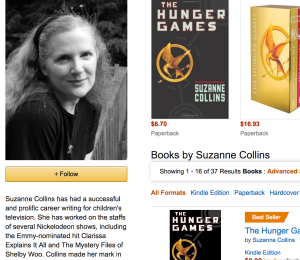
Suzanne Collins Author Central
Amazon – Showcasing your Book (duh)
Sounds easy, huh? Then riddle me this: why have loads of you got it all wrong?! Amazon is searched three times more than Google these days, so you have to have your chickens in a row.
- Do you have a really good book cover? I mean, did you pay for one?
- Did you write a synopsis and spellcheck it?
- Did you include keywords as per Amazon’s suggestions?
- Did you get yourself an Author Central page? Did you fill out all sections of your Author Central page, such as a professional head shot (not a phone pic blown up, or webcam shot, or you with your kids or dogs or partner)
- Did you get your Editorial Reviews in there?
- Have you linked your blog feed to your Author Central?
Social Proof
You need to get your Verified Customer Reviews in next – you need what is called “social proof“. Studies have shown that while up to 79% of potential customers will fall for social proof to make a decision, we have found over the 2 years we have been promoting that social proof on Amazon books only really kicks in when you have 80 – 100 mixed-star rated reviews. This is why first off you need to make sure you have those expert opinions in your Editorial Review section. Expert opinion is still considered far more valuable for a purchase, and this is why Amazon puts this section “above the fold” on your book product page, i.e. in the first part of the screen before you scroll.
Note: Editorial Reviews should not be confused with the internet furore aimed at “paid reviews” – these are reviews that are paid for and pasted illegally in the Customer Review section. Any review paid for has to go in the Editorial section, and you should not post any Amazon Customer Reviews here.
Using mailing promotions like we offer at SPR or those offered at BookBub are the real only ways to make that mark initially, despite many very indie authors saying otherwise (check their sales – it’s revealing) to get the boost you need to start your page off. You need to be really careful to choose a service that uses mailouts and not paid employees or bots to review your books because these are not allowed on Amazon, whereas the mailing promotions are fine because the reviews are entirely impartial. Verified Reviews are the way to go for best social proof and ranking juice – that is, a review following a proven purchase. Although these services are expensive, you will get your reviews, leading to more sales. The reason they are expensive is because the mailing lists do require a lot of maintenance and attention to keep current, and the promotions are very thorough.
(We offer ranking to Top #25 too with our promotions. This sort of ranking will carry you on historically into the future a little way for future ranking also.)
If you decide you don’t want to spend money but you fill out all the sections of your book page and Author Central properly, you have done half the job it takes to get exposure. Amazon does not even rank book pages that lack information or good images.
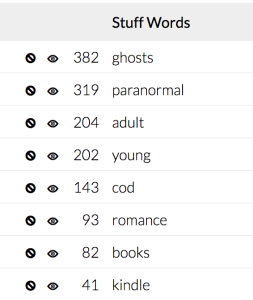 Amazon Keywords vs Google Keywords
Amazon Keywords vs Google Keywords
The thing about Amazon is this: it’s a catalogue. If the keyword is not there, it won’t show your listing when that keyword is typed. That is not true of Google. If you have similarly-themed words, or similar words, and lots of themed links towards that word, you may well show up in Google.
That means for Amazon you need to make sure that in your synopsis you have the keywords you need. Using apps like Scientific Seller might help you with up-to-the-minute buyer keywords, but don’t search in your own search bar – you will be seeing only your own personalized results and not what people are searching for!
Google – Building Positive Links
Google is good to build positive links on. If anyone searches for you on Google by name, you don’t want them to see your personal info and family. You need them to see you as an author. This is a hard one if you are a professional too, but striking a balance between your life as an author and a professional is not difficult if you choose to build links for your book on book-themed sites alongside any professional links. The easiest way to do this is to go on a book blast or book tour. At SPR, we use Promotional Book Tours in our packages. Mandie and Jen are experts at getting you 20-30 book blogs to feature your book and bio, and you will instantly cut out any links you don’t want readers to see such as your personal Facebook, 192 address and phone number info, and pirate sites listing your book for free. What should happen is that anyone searching for you after this will only find results about you as an author, and Google will start fine-tuning those themed results towards showing your bookish links instead of anything else.
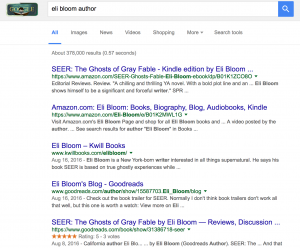 Although meta data (keywords and such) is important to Google, what’s more important is theme. Make sure the synopsis you send around features your genre, book setting, and mood keywords. Unless you are going to start paying for Google Ads, getting enough themed links for your book is the main thing that is going to count for you here as an author.
Although meta data (keywords and such) is important to Google, what’s more important is theme. Make sure the synopsis you send around features your genre, book setting, and mood keywords. Unless you are going to start paying for Google Ads, getting enough themed links for your book is the main thing that is going to count for you here as an author.
A note about your author website – use a URL that tells us who you are. www.authorjohndoe.com or www.janedoe.com will help Google know your business.
Also, don’t be a cheapskate.”www.johndoe.wordpress.com” or “www.janedoe.webs.com” looks awful and amateur. Chances are switching to a proper URL it’s going to cost you $15 a year. If you can’t pay $15 a year, forget it.
Facebook – Good for Ads and Promos
Facebook has reached a saturation point. You go ahead and join a million Kindle Books and Authors groups and pages – but ask yourself this: WHY?
The problem is that all you are doing is creating a hellish loop. If only authors join these groups, you are pasting your book promotions to other authors like you who joined to post their book. Nobody achieves sales. People make miserly comments. This is not only a waste of time but soul destroying also. It’s like printing up a million flyers, delivering them all for hours in the rain, and not one person responds. That’s because it’s junk mailing.
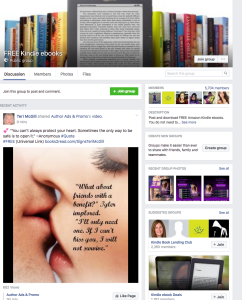
Facebook – Are you just posting to other authors?
There are also those groups for review swaps. These groups give the impression you can swap books with other authors and get a free review. While some authors might get away with it, Amazon have specifically said these sorts of swaps will be deleted from Amazon. This is because they cannot be said to be impartial. Accounts can also be deleted, so I will say it again – avoid, avoid, avoid.
So what is Facebook for?
Not much for posting. Unless you can get posted to a very active group of readers. The million-dollar question – who are they?
The best and it seems, only way to do this is to seek out review and promo services that post to a reader page or group. For instance, we know at SPR that at least half our viewers are readers, and our reach (other people’s Facebook feeds getting shared and liked) is around 5000 more. Sometimes we see books reaching 20,000 readers. Using Boost on Facebook to boost a post on a page is a very useful way of getting 3000+ views in one day. However, many review services do not post to social media at all for their clients, even when you spend over $500 on a review.
Facebook Ads still work well. However, you need to be spending $200 a shot to really make any dent in sales, being careful to choose an audience of the right countries and ages, running alongside other promotions such as a review, book tour, and other pushes like freebies.
My verdict is that Facebook will go the way of MySpace soon. Even my kids don’t use it anymore because it’s too full of junk. They say it’s “full of grannies posting kittens and narcissists posting selfies.” I agree.

JK Rowling on Twitter
Twitter – Good for growing your audience
Twitter is becoming a tool people dump on. Now book promotions look like crap with hashtags and keywords crammed in:
- #FlashFic
- #Romance
- #Horror
- #FanFic
- #YA
- #History
- #IndieAuthors
- #AmWriting
You can grow Twitter followers in a much more useful manner to be honest. Here’s what I suggest:
- Go to other authors you admire or similar to your book on Twitter and click on their followers.
- Follow all their fans
- Most people will follow you back: instant readership
You can also do this with themed TV shows and actors. If your book is about firemen, for instance, go to the actors in Chicago Fire and follow their followers. Did you write a horror? Go to AHS and follow followers. This will give you an instant niche audience.
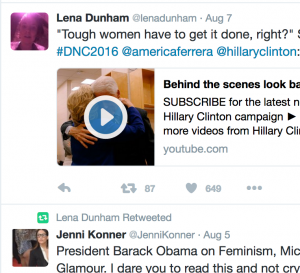
Using @ – @lenadunham
Using @
Another nifty trick is to research which famous people reply to the lowly public when included in an @. Find someone famous who has some relevance to your book and then think up a witty comment. Add @[famousperson’stwittername] and they might reply, thereby promoting your Twitter feed. Hoping the stardust will rub off, you will find a bunch of relevant followers will come to you. I have had comments from Neil Gaiman, for instance.
This of course is only a start. You will have to spend many long hours plugging away, but hopefully this is enough to get you on the right path!
Get an Editorial Review | Get Amazon Sales & Reviews | Get Edited | Publish Your Book | Enter the SPR Book Awards | Other Marketing Services






















Leave A Comment